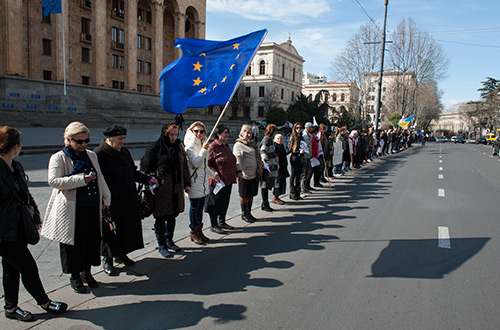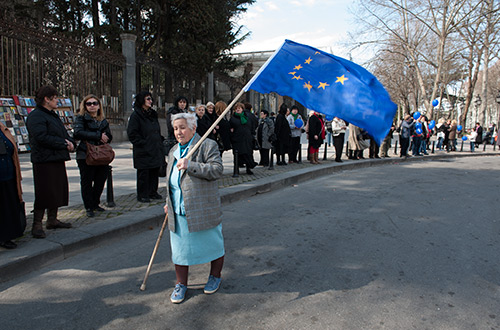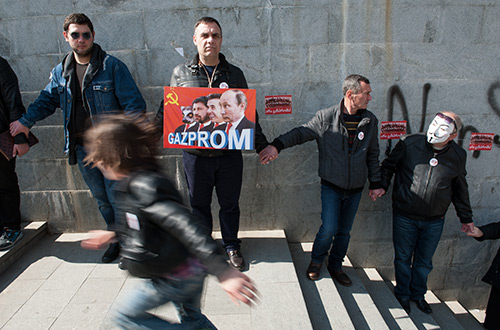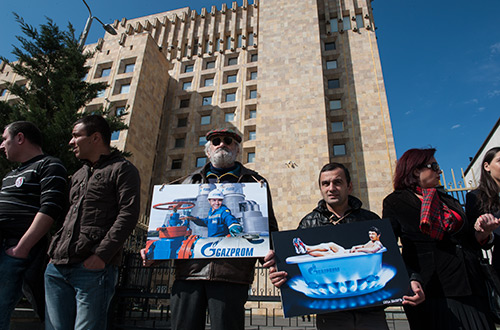| UNM Holds Anti-Gazprom Human Chain Protest |
| Civil Georgia, Tbilisi / 6 Mar.'16 / 18:13 |

People form human chain outside the parliament building in Tbilisi during anti-Gazprom demonstration, March 6, 2016. Photo: Eana Korbezashvili/Civil.ge
Several thousand people formed a human chain in the central parts of Tbilisi on March 6 during a demonstration organized by the opposition UNM party in protest against what it calls were dubious goals pursued by the Georgian government in talks with Russia’s state-controlled energy giant Gazprom.
Human chain was stretching from the government headquarters close to Freedom Square to the Russian embassy building at the end of the Chavchavadze Avenue for more than five kilometers.
UNM first announced about intention to hold the anti-Gazprom demonstration on February 24.

A protester holds a poster depicting Energy Minister Kakha Kaladze in a Gazprom t-shirt and other politicians from the GD ruling coalition, March 6, 2016. Photo: Eana Korbezashvili/Civil.ge
The Georgian government announced on March 4 about a new deal with Azerbaijani state energy company SOCAR on supply of additional of 500 million cubic meters of gas from Azerbaijan, removing the need for additional volumes of gas from Gazprom.
In addition, Energy Minister Kakha Kaladze said on March 5 that Georgia and Gazprom agreed in principle to keep the existing gas transit terms and pay Georgia 10% of Russian gas transported to Armenia via Georgia.

A woman holds EU flag at anti-Gazprom rally in Tbilisi, March 6, 2016. Photo: Eana Korbezashvili/Civil.ge

A demonstrator in human chain protest holds a poster depicting Energy Minister Kakha Kaladze; ex-PM Bidzina Ivanishvili and Russia’s President Vladimir Putin, March 6, 2016. Photo: Eana Korbezashvili/Civil.ge

Protesters in human chain hold posters with one of them depicting ex-PM Bidzina Ivanishvili in a Gazprom uniform and another one Energy Minister Kakha Kaladze, March 6, 2016. Photo: Eana Korbezashvili/Civil.ge
- Energy Minister Says Georgia to Keep Existing Gas Transit Terms with Gazprom
- Georgia Says to Receive Additional Gas from Azerbaijan, No Need for More Gazprom Gas
- U.S. Ambassador on Georgia’s Talks with Gazprom
- UNM Plans Anti-Gazprom Rally
- Georgia Gets Increased Gas Supplies from Shah Deniz in Winter
- Head of SOCAR Holds Talks in Tbilisi
Gazprom wanted to monetize transit fee and pay cash, instead of 10% of gas transported to Armenia via Georgia. In case of monetization, Georgia would not have receive enough cash to buy the same amount of gas it is now receiving as a transit fee; in such case the country would have required to buy more gas from Gazprom. But after announcing about additional gas supplies from Azerbaijan, Energy Minister Kaladze said on March 4 that there was “no need for additional volumes of gas” from Russia at this stage.
In an attempt to claim credit for these deals, the UNM leaders said that “public protest” against possible increase of share of Gazprom’s gas in country’s gas supplies forced the government to maintain existing transit terms with Gazprom and to negotiate additional gas supplies from Azerbaijan.
“For months the authorities have been telling lies to the people, inventing various pretexts to achieve entry of Gazprom into Georgia,” MP Davit Bakradze, leader of the UNM parliamentary minority group said on March 6. “I am sure that after today’s rally the government will not dare to strike an agreement different from [the one that the country currently has].”
“The fact that we have forced the government to say no to Gazprom actually means that this [protest] rally has almost achieved its goal – I say ‘almost’ because the eventual goal will be achieved when we finally and firmly ascertain that we managed to make the government to say no to Georgia’s return back to influence and darkness of Russia’s Gazprom,” he said.
Commenting on UNM’s protest rally, Defense Minister Tina Khidasheli said on March 6 that it was like “pushing against an open door.”
“Nothing that would require holding of such a rally is happening in the country,” she said.
